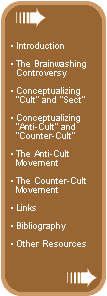
 |
|||||||||||||
|
|
Cult Group Controversies:
Introduction
The concept "brainwashing" first came into public use during the Korean War in the 1950s as an explanation for why a few American GIs defected to the Communists. The two most authoritative studies of the Korean War defections concluded that "brainwashing" was an inappropriate concept to account for this renunciation of U.S. citizenship.
|

| ||||||||||||||||||||||||||||||
|
| ||||||||||||||||||||||||||||||||
|
When several new religions came into high profile during the youth
counter-culture of the 1960s and 70s the concept of "brainwashing" was
again employed as a culturally acceptable explanation to account
for the fact that some idealistic "flower children" came under
the influence of "cult" leaders.
A quarter-of-a-century of scholarly research on why people join new religions has come to essentially the same conclusion as the Korean War studies-"brainwashing" is not a viable concept to describe the dynamics of affiliation with new religions. Defenders of "brainwashing" have used other concepts like "mind control" and "thought reform," but they have failed to produce a scholarly literature to support their claims. Thus, whatever euphemisms may be employed, the basic conclusion against the brainwashing thesis is not altered. Still, the mass media continues to report claims of "brainwashing" as if the alleged phenomenon were real. And, as a result, the concept of "brainwashing" sustains considerable currency in popular culture. It is, to be sure, a powerful metaphor. "Brainwashing" communicates disapproval of influence by persons, or groups, the user of the term considers to be illegitimate. Given the power of this concept to communicate ill-gotten influence, the concept of "brainwashing" will almost certainly remain a central component of the controversy about religious movements. Discrimination, or legal action, against religious groups because someone doesn't like them is clearly a violation of the free exercise of religion, a human right increasingly recognized around the world. But the claim of "brainwashing" shrouds the discrimination by claiming that religious groups are victimizing recruits and potential recruits by employing powerful means of manipulation that are extremely difficult to resist. Social scientists who study religious movements do not reject the general proposition that religious groups (old and new) are capable of having considerable influence over their members. Indeed, most argue that "influence" is ubiquitous in human cultures. But they argue, further, that the influence exerted in "cults" is not very different from influence that is present in practically every arena of life. This section on the Brainwashing Controversy presents materials that will illumine the history of the concept, provide examples of materials that have fueled public debate as it has periodically raged over the past quarter-of-a-century, explore the scientific evidence that is pertinent to the debate, and offer an extended bibliography. The materials presented here will permit interested persons to explore the controversy in considerable depth. My own perspective is squarely in the social science camp in opposition to the "brainwashing" thesis. Most persons and groups who promote the "brainwashing"/"mind control" perspective do not acknowledge the existence of a scholarly literature that challenges their perspective. Or, if they do acknowledge the existence of a scholarly literature, they dismiss it with ad hominem arguments. We offer ample writings that are representative of both scholarly and ideological perspectives and leave it to readers to weigh the evidence themselves. I would also invite readers to explore my course lectures on topics relevant to this issue. The most directly relevant lecture is on the topic of brainwashing. A second lecture on influence highlights arguments set forth in a popular book by Robert Cialdini entitled Influence. The objective of this lecture is to raise students' consciousness of the prevalence of influence in every arena of life. Other lectures explore social science literatures that illumine the questions of why people join new religious movements and why most of them leave after a short period of time.
Let me also encourage you to
Analytical Perspective (Neutral) .
Against Brainwashing Thesis.
"Brainwashing": Career of a Myth in the United States and Europe. Gordon Melton essay on Center for Studies on
New Religions (CESNUR) Page.
"Liar, Liar": Brainwashing, CESNUR and APA by Massimo Introvigne.
"The Swiss Canton of Geneva Publishes a Report on Mind Control, Proposes Anti-Brainwashing Legislation" by Massimo Introvigne
Thought Control, Totalism, and the Extensions of the Anti-Cult Critique
Beyond "Cults. by Joseph Davis. Reprint of short monograph on this site.
A Critique of
"Brainwashing" Evidence in Light of Daubert: Science and Unpopular Religions".
by James T. Richardson and Gerald Ginsburg (1998).
"A Social Psychological
Critique of "Brainwashign Claims About Recruitment to New Religions" by James T.
Richardson (1993).
Documents on
Brainwashing Controversies documents that have contributed to shaping the
legal status of the brainwashing controversy.
Tra brainwashing e libera scelta.
Per una lettura psicologica dell’affiliazione ai Nuovi Movimenti Religiosi.
"Joining
Religious Movements: The Brainwashing Model". Lecture by Jeffrey K. Hadden,
University of Virginia for New Religious Movement Course. See also:
Joining Religious Movements: Social Science Models
Affirmations of Brainwashing Thesis.
"The Battle for Your Mind". A lengthly document by Dick Sutphen argues that brainwashing techniquest are being used on the public today.
"The Process of Brainwashing, Psychological Coercion, and Thought Reform". A summary table of
Chapter 3 from Margaret Singer's book, Cults in Our Midst.
"Totalism
in Today's Cults" This essay by Jan Groenveld of Cult Awareness and Information
Centre in Australia. Groenveld begins by stating that "Studies have shown that today's
cults use a stronger form of control than those of 50 years ago." The author employs
Festinger's theory of cognitive dissonance and Lifton's untested typology of a
"totalist" environment as orienting perspectives. The assertion is repeated, but
no evidence is offered.
"An Article on
Brainwashing" The person posting this short article admits that he/she does
not know the identity of the author. Regrettably, this is a fairly typical example
of anti-cult literature. Ideology is much more important than evidence.
Against Brainwashing Thesis: The Classic Korean War Brainwashing Studies.
| ||||||||||||||||||||||||||||||||
Also available in this site section: